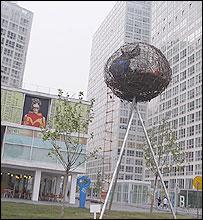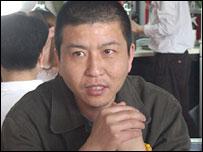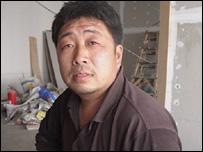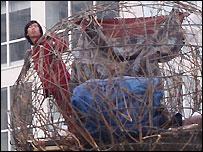 The nest is in one of Beijing's most fashionable areas |
But it is also home to art curator Zhu Qi's latest installation, a giant bird's nest elevated 10m above the grass on a tripod of steel rods.
Inside the nest lives artist Ye Fu, who is making it his home for 30 days and 30 nights.
He can be seen resting, reading, writing poetry, sipping tea or eating one of two daily meals.
Zhu Qi's idea behind the nest is clear.
"I want to create a discussion about the speed of China's economic development," he said.
"Everyone has been sucked into a whirl, everyone is killing themselves to work, and then for relaxation everyone kills themselves to have fun," he said.
He admits that he, too, is a victim of the rapidity of change, as China's economic reforms have transformed the country and people's lifestyles.
"I don't even have time to fall in love," he said.
Promoting discussion
As part of the project, Zhu Qi is holding a series of discussions to coincide with Ye Fu's nest residency.
 Zhu Qi wants to persuade people to examine their lifestyles |
"Commercial culture... which derives its strength from the property generation... is distancing humans from nature and it is affecting the interaction between people," he said.
He argued that the bird's nest had an important role in "beginning to make us examine our lifestyles, and think about the aspects of our lives which need to change."
Shu Kewen, a journalist from Lifestyle Weekly, argued that there was nothing wrong with "good commercial culture".
"When fashion is done well, it can make people's lives richer too," she said.
But media student Wang Yiting does not agree. "Everyone's life is so regulated," she said. "The nest provides them with a contrast, and lets them think that actually there are different ways to live, and then the media creates this into a topic and this becomes a form of public opinion. This is really important," she said.
Mixed views
Passers-by have different reactions, but everyone looks twice.
 Ye Fu sleeps on the street. I was also sleeping on the street for a couple of nights. Looking at him helps me |
"It's ridiculous, a show, someone trying to get famous," he said.
Others, like 29-year-old interior designer Dang can relate to the message.
"I feel there is lot of pressure from work and society," she said. "I have thought about looking for this kind of life, but it would be really difficult to find a place like this and to carry it out to this extent."
One of China's major web portals, Sohu, has carried out a survey monitoring responses to the bird's nest.
It found that 76% of people said they felt too much pressure from city life.
But only 10% felt that their lifestyles needed to change.
While Zhu Qi may not be able to convince Beijing's go-getters to slow down and reflect on their drive, the bird's nest does seem able to inspire people from other walks of life.
Zhang, a 36-year-old migrant worker, is refurbishing one of the area's offices.
I found him sitting down, transfixed by the nest.
 Ye Fu is spending 30 days and nights in the nest |
"I am here working so hard every day on this construction site. Everyone here is so cold. My family is far away and I am working to pay for my children's school fees. I don't have a fixed place to sleep.
"Ye Fu sleeps on the street. I was also sleeping on the street for a couple of nights. Looking at him helps me."
Zhang now sleeps in a dark corner of the 16th floor of an office block, his bed a piece of cardboard.
"There are not enough people in China like Ye Fu," he said. "I think there is some kind of connection between his situation and mine. I am not sure what it is, but he gives me hope."
On its second day, the local authorities threatened to take down the bird's nest.
But Zhu Qi signed an agreement with them promising the nest would not cause any political difficulties.
Open public discussion makes the authorities in China uncomfortable.
The irony for Zhu Qi is that, as much as he aims to inspire people to think critically about the lifestyle generated by China's new capitalism, it is only dynamic, private enterprises like SoHo that make it possible for provocative art to be on Beijing's streets.





